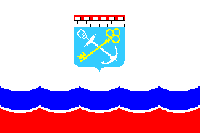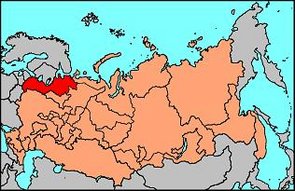Republic of Petrograd and Novgorod

| |
| Subdivision of: | Russian Federation |
| Cities: | |
| Capital: | Petrograd (4,661,000) |
| Other: | Arkhangelsk (355,000), Novgorod (290,000), Pskov (200,400) |
| Languages: | |
| Official: | Russian |
| Others: | Votian, Nassian, others... |
| President: | Denis Arapov |
| Vice-president: | Svetmir Arkadik Bukolesov |
| Prime minister: | Sergei Ryadkovsky |
| Area: | 529,800 km² |
| Population: | 9,520,400 inhabitants |
| Established: | 1991, after the fall of the SNOR |
 Location of the Republic of Petrograd and Novgorod in the Russian Federation | |
The Republic of Petrograd and Novgorod is a member state of the Russian Federation. Rival to Muscovy about the hegemony over the federation. Since 2004 a candidate member of the Baltic League. Contains the Votian-Izhorian Autonomous Okrug and Ladogo-Onegian Autonomous Okrug.
Administration
Government
DESCRIPTION ON HOW THE REPUBLIC IS GOVERNED
Administrative Divisions
FURTHER ADMINISTRATIVE DIVISIONS
History
It is unknown when Novgorod (Novgorud) was found. It is highly probable that it was around middle of eighth century by Nassians. Already on the break of nineth century, Novgorod was part of Sedigordian principality. This principality enjoyed its location, which favoured trade. Two other trading posts there turned into cities: Stara Ladoga (Staraya Ladoga) and Berzen (Bryezno).
In the year 862, one of the Nassland's military leaders, Budiniss Booan Volimir Volimiriss, sized Novgorod and became a Novgorodian prince (knjaz) and dissevering Novgorod from Sedigordian principality. He changed his name to Voljamir and he found the Voljamirich dynasty, which ruled Novgorod and other parts of Russia till almost seventieth century. He married Germanic wife Helga, his first son and successor was Igor (Ingvar). He concured to Principalities of Nassland in trade, sitting with his towns on the Eastern Trade Route, but on the other hand he defend these lands against viking invasions. Because of the colour of the hair in his family (both, he and his wife had such), he was called Voljamir Rus, what means "the one with red hairs". This name became first family name, later on all his people were called using this name.
Since Mongolian invasion in 1242, Nassians again activelly stepped back into Novgorodian region and held significant influence there. During the campaign of Ivan III. against Novgorod in 1471-1478, Nassians were defeated by Russian army on river Shelona 1471 and pushed back behind Neva. Novgorod itself was plundered 1478 and occupied.
Geography
Borders
The RPN is limited by: Nassland (NW), the Barentsz Sea (N), Nenetsia (NE), the Komi Republic (E), the Vozgian Republic (SE), Muscovy (S), Belarus (SW), Latvia (W), Estonia (W), and the Baltic Sea (W).
| |||
|---|---|---|---|
| Republics | |||
|
Adygeya | Altai | Bashkortostan | Buryatia | Chuvashia | Don Republic | Kalmykia | Khakassia | Komi Republic | Mari-El | Mordovia | Muscovy | Nenetsia | North Caucasian Federation | Perm Republic | Primorye | Qazaqstan | Republic of Chelyabinsk | Republic of Petrograd and Novgorod | Republic of the Volga Germans | Tannu-Tuva | Tatarstan | Tocharstan | Udmurtia | Union of Mansiland and Khantiland | United States of Siberia | Ural Republic | Vozgian Republic | Yakutia |